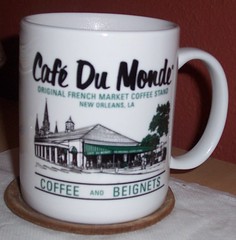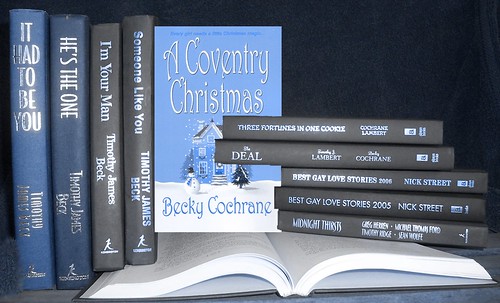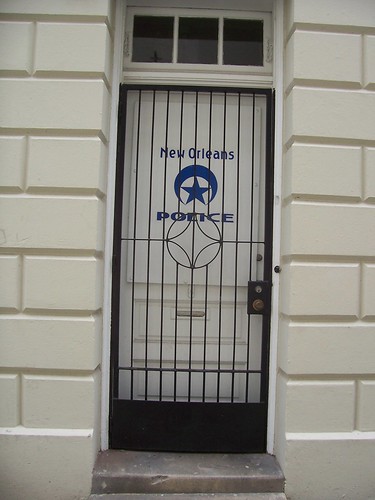
Today’s coffee cup is brought to you courtesy of seahorsemystic, who last year sent The Compound a gift basket from the wonderful Cafe’ Du Monde in New Orleans. In just a few months, I’ll be eating beignets again in The City That Care Forgot.
Comments are appreciated and answered.


I was looking at Noel Alumit’s blog, wherein he borrowed from someone the idea of
Literary Highlights of 2006.
Here are mine.
–Most difficult literary moment–
Knowing we weren’t going to finish TJB5 when we were scheduled to.
–Most literary dinner–
I don’t know the restaurant, but Tim and I ate dinner in New Orleans with Dan Boyle, Jim Gladstone, and Kelly McQuain. I was already enjoying myself tremendously with these writers when Trebor Healey meandered in and mesmerized me with his conversation.
–Most literary uplift–
When Tim and I were chosen by Greg and Haworth to edit the MOONLIGHT AND ROSES anthology, as well as being trusted by the contributors with their short stories.
–Most literary weekend–
Saints and Sinners Literary Festival in New Orleans in May. What a good time, with smart and funny people, wonderful writers, interesting topics, and a great city to host us.
–Most literary overload–
I handled writing a novel solo pretty well. But when it came time to add to it based on editorial comments, I felt overwhelmed and lonely.
–Most literary joy–
The e-mail from readers about A COVENTRY CHRISTMAS.
–Most literary regret–
What feels like my most intense writing accomplishment to date, THREE FORTUNES IN ONE COOKIE, got the least nurturing, attention, and sales because of circumstances beyond my control.
–Most literary purchase–
The abundance of good fiction I bought so that I could lose myself in other people’s writing.
–Most literary duty–
Being part of a panel discussion at Saints and Sinners on writing gay and lesbian romance.
Famous Author Greg Herren, who’s currently on yet another whirlwind book tour, this time on the West Coast, in the spirit of the Reading is HOT! campaign, captured two of L.A.’s sexiest writers (brains AND looks AND charm AND wit, trust me on this), Trebor Healey and Dan Boyle.

You guys are great sports; thanks.
I’m so freaking tired but I can’t sleep. My mind won’t get quiet.
I’m sorry for my friends who are affected by the onset of winter. I wonder if I would feel the same dread if I lived in a colder climate.
Lisa and Mark–thank you, thank you, thank you. You don’t know how much your comments on CC have meant to me. I’ll try to be more specific when I get some of these deadlines off of me and can actually write e-mails again. And Lisa–chocolate? Thanks!
I feel really, really good about a project Tim and I have been working on. We are almost at the point of releasing details. It’s nothing you can buy soon, but I don’t mind promoting it for the next year because it’s worth it. And I’ve learned so much.
Greg comes through again Monday on his way back to New Orleans and will spend another night. That’ll be good.
Then, Jim, Tim, and I will be wrapping up TJB5 and getting it to the publisher. I’ve been so grateful for the extra time Kensington gave us because all three of us have been dealing with challenges unrelated to our work. I know Jim rarely reads my LJ, but I’m sending lots of positive thoughts his way, and for his friend. Also good thoughts to my SIL who’s in the hospital. I hope she has a speedy recovery.
Maybe my mind won’t be still because I’m reading too many books at once. I just realized today that I’m reading LOVE, BOURBON STREET (ed. by Greg Herren and Paul Willis); OTHER VOICES, OTHER ROOMS (Truman Capote); FROM BOYS TO MEN (ed. by Ted Gideonse and Rob Williams); AMMIE, COME HOME (Barbara Michaels); and WHAT I DID WRONG (John Weir). Maybe if I read these one at a time, so I could remember how to finish things, I wouldn’t have all these writing projects going simultaneously.
I guess I like variety too much.
Photo Friday theme: Private

After you stay up all night driving yourself crazy trying to get information, it’s really cool to wake up to an abundance of new posts from dogrl, samdewinter, seahorsemystic (friends only, sorry), and davidpnyc. And some with photos!
Now that’s a good Sunday afternoon.
P.S. Oh! And now one from scottynola, too! Now if only that FARB would make an appearance…
What the hell is chicory, anyway? This link tells you, if you’re interested.
Anyway, as Tim explained in his LJ, today we got a gift from seahorsemystic. OH MY. To treat Tim, AND Tom, AND me, to cover all our birthdays for the year, to just be the giver she is, we have chicory coffee (regular and decaf) from New Orleans’s Cafe’ Du Monde, along with a coffee mug, a coffee cup, a souvenir coffee cup that’s so cute it immediately went into my “special” curio cabinet, and an apron with an illustration of the famous coffee stand.
Now why would one need an apron? Because when one makes beignets from the mix that also came in the gift basket, one will need to fend off all that powdered sugar.
Lindsey, it’s on! Beignet fry-fest when everyone’s done with their traveling. Shannon, we will lift a coffee cup to you. You’re so kind. Thank you.

One of the panels I was most eager to attend at Saints and Sinners was “Is AIDS still part of the plot?” Moderated by Thomas Keith, the panelists were Jameson Currier, Martin Hyatt, Robert Taylor, and Patricia Nell Warren. I was pleased to see a good turnout, and a lot of excellent points were made by those in attendance as well as by the panelists.
I’m still mulling over those discussions. AIDS was the biggest reality of my life from 1990 to 1997, at which point, like many people (most of whom endured a hell of a lot more than I did), I had to back away. Exhaustion, grief, rage, caregiving, activism, despair–all took a toll on those who survived the massive losses of the 1980s and first half of the 1990s. Two major changes required new approaches to the epidemic–the affected population and the appearance of protease inhibitors, and those new approaches needed people with fresh energy and commitment.
I would still donate a voice–I’ve never stopped advocating on behalf of those with HIV/AIDS–and I would still donate money, but it was necessary for me to take some time to grieve for my own personal losses. I knew many people who died, but four of them were among my dearest friends. Although those four had encouraged me never to shut up about the things I’d seen and the things they and their friends and lovers went through, they also wanted what anyone wants for those they love–that I be happy.
When the last of the four was gone, I was left wondering if I’d ever laugh again the same way. Feel joy. Hope. Optimism. If I’d ever know friendships again with that kind of intensity and loyalty and depth.
Of course, I have. Along with those who supported me during the hard times, I met friends who were willing and uniquely able to help lift the baggage I came with. Oh, even more. Friends who were willing to let me open those bags and show what was inside over and over, as often as I needed to, until finally it wasn’t baggage at all. It was part of my history and part of what kept four men I loved from being only names on Quilt panels.
I think it’s vital that people write their AIDS realities into fiction. I often read blogs of people who survived those first fifteen years; they are riveting. And their stories still provoke discussion and arguments. Those are the stories wherein AIDS is often the entire picture.
From the last ten-plus years, we also need stories wherein AIDS is, as Patricia Nell Warren said, “part of the mosaic.” Not the whole story, but part of the story. The storytellers need to come from all of the affected populations and speak to all of the affected populations.
Writers of gay fiction faced a challenge in that readers were tired, so tired, of tragedy and heartbreak. Just as my friends hoped for me, people wanted to laugh again. To feel joy. To read about love that wasn’t doomed and sex that wasn’t fatal.
Although in the six novels I’ve helped write, we’ve lost an important character because of AIDS and referred to the deaths of several others, I, personally, have never been able to fictionalize what happened to me between 1990 and 1997. I think there’s one circumstance in IT HAD TO BE YOU and one line in HE’S THE ONE that came directly out of my experience. Beyond that, the most I have consciously done is make safer sex and HIV/AIDS part of the awareness of the characters I write.
The way that I do honor my friends, the living and the dead, and all the friendships that were written about and so profoundly affected me from that first AIDS fiction, is to write about people who are fiercely loyal to one another. Who are there for each other across many years. Who transform their breakups and their rivalries and their misunderstandings into forgiveness, support, and friendship. Who still believe in love and hopeful endings. Those are the qualities of the friends I knew and lost. They are the qualities of the friends I still have.
If it’s an organic part of what we, or I, write, I hope that HIV/AIDS will always be some part of our novels. I only want to make sure that it’s written authentically.
If I’d gotten nothing else out of Saints and Sinners (and I got more than I ever imagined I would), the thoughts this panel provoked about my writing made it worth it.
When Tim and I were walking through the French Quarter last weekend, we passed by Lyon & Lyon art gallery (their site is under construction, so I have no link yet).
Tim’s eyes were drawn to a painting by artist Paul Tamanian (Tim said it was how he wished he could make his bathroom floor look).
I stepped into Lyon & Lyon on Sunday morning, and found out that Tamanian originally worked in ceramics, but ended up using metal, beating the hell out of it in various ways to create his art. He makes sculptures as well as paintings, and the woman at the gallery let me lift one of the sculptures so I could see how deceptive its heavy appearance was.
Tamanian’s work is also being shown at galerie dalray in New Orleans.
And below is some of his art at Galleria Silecchia in Sarasota, whose site also includes photos of Tamanian at work.
see photos of paintings
But first, a diatribe…
read diatribe here